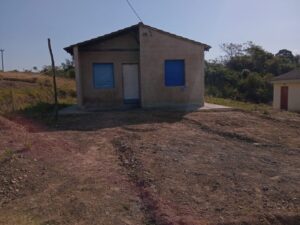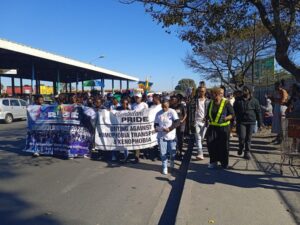Since Monday, hundreds of homeless people who have been calling the streets of Cape Town CBD their home, have been moving to shelters while others are looking for alternative accommodation spaces.
City spokesperson, Luthando Tyhalibongo, told Elitsha on Thursday that a total of 32 homeless people were transported to the city’s Ebenezer Safe Space in Green Point, while seven others were relocated to areas of their choice. The removals are expected to continue until Sunday.
“Among them was a family of three who were taken to the provincial social development department for placement. Persons who refused assistance were simply required to leave the occupied sites and abide by the terms of the order not to reoccupy the city’s land. The city’s offer of dignified transitional shelter [the so-called ‘Safe Spaces’] and social services remains available at all times for those who have not yet accepted,” said Tyhalibongo.
The city obtained a court order in June 2024, which gave them the permission to remove homeless people from several sites in the CBD. Many people who spoke to Elitsha last month expressed their dissatisfaction with the decision to take them off the streets.
‘Safe Spaces‘ are like prisons
Last week, most of the people we interviewed cited the living conditions in these ‘safe spaces’ as inhumane and have threatened to fight back, to continue staying in the CBD. James August, originally from Ravensmead, has stayed on the streets for over 15 years. “The law is turning its back on us, as homeless people. These shelters are like prisons. The rules are so ridiculous. You have to wake up at 5 a.m., only to get a cup of hot water. The food is just a glass of porridge in the morning and that is for the whole day. We are called ungrateful when we talk. The showers are cold, the toilets are very filthy and inhumane to use,” said August.
“This eviction is a crime against homeless people. I have seen people die in front of me. Even when a person is sick, for the ambulance to come, it takes a very long time. There is no space and they are overflowing,” he added.
‘The streets are
much better’
Genevieve Mautty, who recently moved to a shelter, also describes the living conditions as inhumane. “It’s been a week now. I refuse to stay in a shelter. The reason is that I am a woman, and it’s cold at night, plus the rainy weather. And it is not nice in the shelter. You get four slices of bread in the morning, that’s it. After that, you must leave and come back at 5:30 pm. The streets are much better, because you hustle for yourself as long as you don’t break the law. Here we survive through recycling cans. I am at the moment in the shelter, but I am unhappy there,” she said.
“The way they wake you up, it’s very forceful. It is not about the rules, as all shelters have the rules. We obey them. But there is a manner of speaking to people, or threatening people. People will obey for now and go to these shelters because it is winter, but when summer comes, they will be out on the streets again,” said Mautty.
Genevieve and Jamieldine Mautty describe the decision to evict them from the streets as a “crime against the vulnerable”.
Poppy Meils (56), originally from De Aar in the Western Cape, has been staying on the streets of Cape Town for more than eight years. “I don’t want to go and stay in a shelter or any safe space. Firstly, I don’t work or have any job and these shelters want us to pay for sleeping in there. And another problem is the fact that I will be separated from my partner in a shelter. If they evict us, I will have to come up with another plan, but I don’t see myself staying in a shelter,” said Meils.
She described the city’s shelters as prisons “because we are locked up for long periods. Even the food is like prison food. I cannot be stubborn when they are really planning to take us there, but it is not a good place. I survive here through crumbs and hustling. We don’t have a good relationship with law enforcement, because they treat us with disrespect.”
‘Safe Spaces are
not safe’
Zolani Nguza, originally from KwaLanga, says the problem with ‘Safe Spaces’ is that they are not safe. “We are treated like prisoners in the shelters. Even the food served is very terrible. There is no respect for us, and if you complain, they will tell you to be grateful. I wish the city can really sort out the conditions,” said Nguza. He added that shelters are not a permanent solution as people are kept there temporarily and later told to fend for themselves and leave.
Brendan Louw, originally from Manenberg told Elitsha that they will have to obey the order to vacate but believes the city didn’t properly consult them before going ahead with the evictions. “These Safe Spaces are already full. We have never seen the mayor of Cape Town coming to consult us as homeless people; he just sends his cronies to come and chase us away, like dogs. It is so unfair. We are humans. At least they can offer us better alternatives for us to stay, maybe an open field where we can decently live as well,” said Louw.
Ntokozo Ndlovu (25) sitting inside his makeshift structure along the FW De Klerk Boulevard is one of the people who have been forced to move to a ‘Safe Space‘.
Homeless people have human rights
Senior attorney at the Socio-Economic Rights Institute (Seri), Nkosinathi Sithole, said the City of Cape Town doesn’t have any proper plans to address homelessness. “The city acted haphazardly and has no proper plan to deal with homeless people in Cape Town. These shelters and ‘Safe Spaces’ are a temporary solution. There are certain pockets of land belonging to the city, which were not covered by this order. Shelters are not the solution. These shelters are not properly run. They are given to private security providers, who abuse these people,” he told Elitsha. To address homelessness in Cape Town, Sithole argued, the city should rather focus on fixing their derelict buildings and giving homeless people their own space.
As much as the City of Cape Town won an eviction order against the homeless, he is gratified that Seri won the assurance that the human rights of the homeless would not be abused in the process. “The city didn’t offer to give homeless people alternative accommodation in their initial court application. But we fought them on that. The rules in the shelters say people must stay for six months, and we challenged the city on that one too. The June court order said we are entitled to an extension if people are still without suitable alternative accommodation after this time,” said Sithole. He said they have also challenged the city on the curfews imposed on occupants of shelters.





